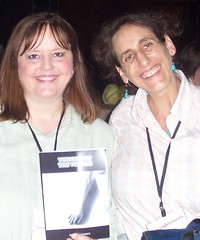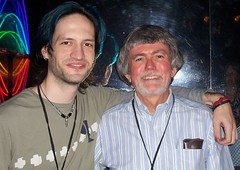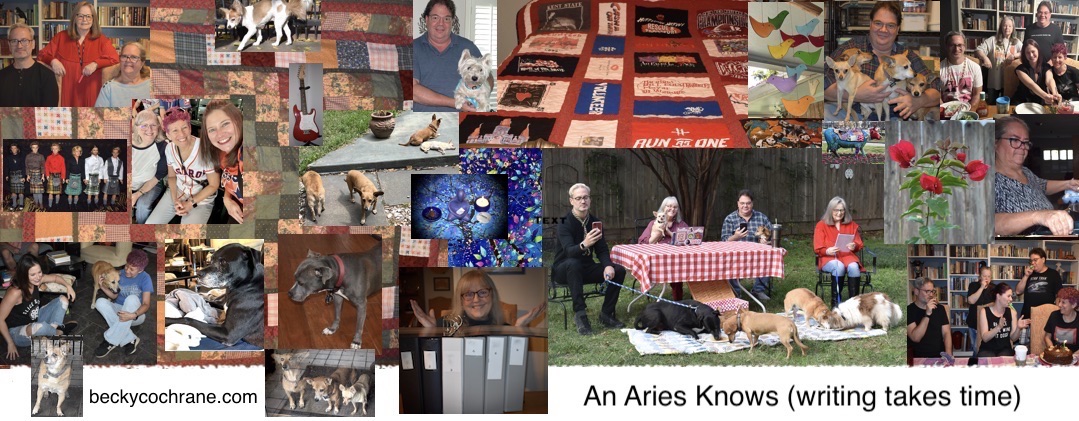Last year, one of my favorite panels at Saints & Sinners was a discussion of whether HIV/AIDS is still part of the story. There was a bit of a crowd at that one, with some good questions, and the speakers were excellent.
This year, though the crowd was a little smaller and quieter, the speakers at HIV/AIDS Awareness: A Novel Approach were equally excellent. As long as S&S hosts a panel on writing about HIV and AIDS, I’ll be in the audience, because this is my particular writing challenge that I grapple with. Though I think there is mention of AIDS/HIV in every novel I’ve written/co-written, and certainly there are references to safer sex, those moments in fiction barely scratch the surface of my real-life experiences.
Those experiences as a friend to people with AIDS, sometimes including the role of caregiver, are ones I’ve never been able to write about with any consistency or with a voice that satisfies me. For one thing, anything that sounds like self-pity is abhorrent to me. I’ve NEVER felt sorry for myself at any point on my HIV/AIDS journey. I’m not infected, though in truth, there’s no reason why I shouldn’t be. I was just as ignorant as everyone else of the coming disaster in the mid-1970s to early 1980s, and I was as sexually active a single person, enjoying the same freedom from old rules and restraints, as anyone of my generation, whether straight, gay, or any variation thereof.
Nor did I feel like I was a victim as I watched people I loved suffer and die. I felt blessed to know and be part of the experiences of the people that HIV/AIDS brought into my life, and I don’t just mean my friends. I watched with awe as their other friends, lovers, healthcare workers, families, ministers, and even total strangers gave and gave–of their time, their money, their talents, their voices, their compassion. For every moment of pure rage I had, particularly about so-called “leaders” who ignored the problem or turned away, I witnessed countless moments showing the best of humanity.
For example, there’s a boss I had. I’d just gone from temp status to full-time, permanent employee when Steve went in the hospital for the last time. My boss accommodated me–a new employee who she’d known less than three months–in countless ways, including getting me bereavement pay when I was still a probationary employee, and even though that benefit applied only to the loss of an immediate family member. There was nothing in my situation that in any way related to her life–she was just a caring person who wanted to help in whatever way she could.
I have so many of those stories, but I’ve never found a way to articulate them in any order or in any way that would truly capture the miraculous people and the depth and breadth of those astounding seven years of my life and their terrible aftermath. So I’m always interested in how other writers approach HIV/AIDS, and on that last day of Saints & Sinners, I was privileged to hear a compelling discussion from:
–The moderator, Dr. Ronald Wilcox, who’s been treating children, students, and adults with HIV/AIDS for nearly twenty years through his work as a staff physician for LSU, at Charity Hospital’s HIV Outpatient Program, and through not-for-profit outreach (including serving on the board of the NO/AIDS Task Force).
–Author Robert Taylor, who was also on last year’s panel, and whose novels touch on HIV/AIDS as part of the reality of his characters, include All We Have is Now, Whose Eye is on Which Sparrow, and most recently, A Few Hints and Clews.
–Author Kevin Winge, executive director of Open Arms of Minnesota, who has written about his work with HIV/AIDS-impacted communities in South Africa in Never Give Up: Vignettes from SubSaharan Africa in the Age of AIDS.
–Author Patrice Melnick, who teaches in the MFA program at the University of New Orleans and who read from her memoir Turning Up the Volume.
I can’t praise all of them enough, but I have to say that Patrice rocked my world. She gives proof to Greg Herren’s contention that someone who does a good job of reading aloud can sell books, because I was completely lost in her narrative, feeling myself right there in the encounter she was reading about as if it were happening to me. After the session, I couldn’t buy her book fast enough, was thrilled when she signed it for me, and came home and read it in one sitting.
I always love to read the prose of poets because of their ability to make language sing so precisely. Patrice does that in her memoir as she describes experiences and emotions from twenty years of being HIV-positive by talking about her love of music, dance, romance, and life, often with humor, always with honesty. I hope I’ll get to read lots more of her lyrical voice in future collections detailing her experiences.
Hope–that’s the real difference for me between HIV/AIDS in the twentieth and twenty-first centuries, but I never fool myself that it’s over. It’s not, so I’m grateful for every person who continues to write truths about nearly three decades of HIV/AIDS.

Me with Patrice Melnick.

Tim with Robert Taylor.

I saw this fascinating documentary about these people who were exposed to HIV, but didn’t get infected. It turned out that these were also the descendants of those who lived in places ravaged by the Black Death but had survived. It turned out that they had some gene that apparently made them resistant or even immune to infections. Researchers are studying this as one possible way of keeping people from getting infected or a possible cure someday.
The issue continues. While we have some education in schools today, there are still some, like my high school, Tuscola High School, Waynesville, North Carolina, where they have 500 students infected with HIV, currently. It’s those statistics that bother me greatly, since we all should have a good knowledge of HIV and AIDS. (I just found out about those statistics from my father)
I do know some of my friends in clubs will bareback, and it frightens me to no end.
I realize it’s a tough issue to put into novels, but I like the way you do it. It’s a part of life, sadly, but you make it understood that way. I don’t think there is self pity in the way I read it.
I also believe that all of us have some one we know who has died from it or who has it.
I’m glad that I went to that panel with you.
Patrice Melnick does to an awesome job of reading her work aloud.
Robert Taylor seems like a heck of a nice guy. He gave me a hug at the last day party.
Sometimes, some of your best writing comes from sharing a piece of yourself. I’m happy I get to know you. 🙂
I’m sorry to say that, even though I live less than thirty miles away from Minneapolis, this is the first I’ve heard of Open Arms Minnesota. I think I may look into volunteering there at some point in the future — hopefully sooner than later.
I have to commend you for your continued commitment to HIV/AIDS awareness and … “memory-keeping.” When I was in high school, from 1993-1997 (I know; I’m an infant), I was a very active volunteer with the local chapter of the AIDS Resource Center of Wisconsin. I’m proud to say that I was even named one of four agency-wide Volunteers of the Year in 1997. Mainly, I was doing peer-to-peer outreach by way of school and community presentations, self-publishing (read: “photocopying”) a monthly informational ‘zine (Whither ‘zines? I think the internet did them in), and participating in peer advocacy on behalf of GLBT youth.
I really don’t know what drew me to this work. Were it simply résumé fodder, I think I would have chosen a less polemical “cause.” I assume my activism was, in part, born from feelings of ineffectuality in my crisis-fraught family, and repression in my Catholic school. I was fortunate to happen upon a movement that made me feel like I could be an agent of change, even though I possessed no credentialed value and was, in essence, “just some kid.”
That work informed my worldview so much, and ultimately brought so many unquantifiable rewards that I definitely feel like I should try to resume it, in some small measure.
They were captains on that panel, and they’re not letting go of the wheel in the storm. Excellent.